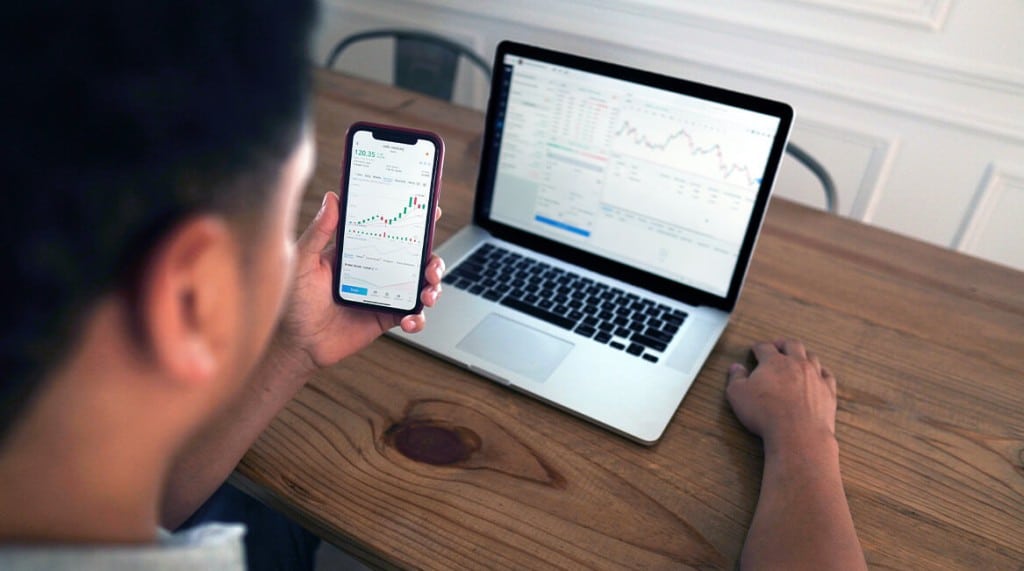What are ETFs? If you are wondering about this, you have come to the right place. In this article, you will get the answer to this, as well as whether ETFs are something you should invest in.
An ETF is a fund that can be traded on the stock exchange. The advantage of this is the flexibility to be able to buy and sell quickly, but this can also lead to ETFs being subject to trading, which creates greater volatility than in traditional funds.
You can also read more about ETFs, why they were invented, and what advantages and disadvantages you get by investing in one.
And not least – how large a selection of ETFs do you have as an investor? After reading the article, you have the answers.
What is an ETF?

ETF stands for Exchange Traded Fund, i.e. a listed fund. This is a type of investment fund that is traded on the stock exchange, in the same way as individual shares.
ETFs are very similar to traditional mutual funds. You can sort of imagine them as a basket, made up of different companies, commodities or bonds.
Investing in ETFs have become increasingly popular in recent years, and many investors are now considering them as an alternative to traditional investment choices such as mutual funds and individual stocks.
And that leads us to the next question…
ETF VS Fund: what are the differences?
The differences between traditional funds and ETFs are:
- How they are traded
- How much they cost you in management fees
You see, ETFs arose as a response to the limitations of traditional investments such as mutual funds and individual stocks.
Funds for example, are usually only traded at the end of the trading day to NAV price. In addition, it took some time before the money from the sale arrived in the share account.
This made such funds difficult to get out of quickly, if the investors wanted to, or for various reasons needed to withdraw the money quickly.
In addition, ETFs would reduce the cost level of traditional mutual funds, so that it would be more profitable for long-term investors to invest in them.
Benefits of investing in an ETF

Here are some:
Flexible
One of the biggest advantages of ETFs is the flexibility you get as an investor.
That is, if you are an investor with a more short-term strategy, or who likes to follow developments in the stock market and see what price you pay at the same moment you buy.
Well-suited for dividend investors
Many ETFs actually pay dividends instead of reinvesting on behalf of investors. Many 'income investors' appreciate that, and few Norwegian mutual funds do.
Some popular dividend ETFs:
- SDPR
- JPIN
- WPS
You can find these and thousands of other ETFs at the online broker Nordnet. I recommend them to you who are looking for a wide selection of shares, funds and ETFs.
Often lower costs than active mutual funds
Another advantage of ETFs is their low management costs – which are often lower than traditional active mutual funds.
It is an advantage for you who buy regularly and are long-term. Over time, high management costs will negatively affect your return enormously.
Just see the tweet from Compound Quality about this:
When Buffett would have managed Berkshire Hathaway as a hedge fund (2% ongoing charges and a performance fee of 20%), an investment of $1000 would have grown to $300k over 45 years.
— Compounding Quality (@QCompounding) December 15, 2022
However, without those fees, your investment would be worth $4.3 million!
Costs matter. pic.twitter.com/kQtsvYZfu4
Great selection of sectors and industries
Another advantage of ETFs is the wide selection they give you.
ETFs come in many different varieties. You get:
- Index funds, such as the S&P 500, or the dividend-paying SPHD
- Certain sector funds, such as technology, ESG and so on
- Commodity funds, such as gold and silver
Disadvantages of investing in ETFs
But there are some disadvantages to ETFs that you should also be aware of, including:
Even with low fees, there are some costs to consider
Brokerage fee: When you buy and sell ETFs, you have to pay brokerage, just like with individual stocks. This can be expensive if you shop often, for small purchases.
Currency exchange fee: Are you going to trade in a currency other than Norwegian kroner? Then you have to take this into account when you buy an ETF, and you can both make and lose a few kroner from currency changes. This is something you avoid when trading in traditional funds.
Trading with ETFs results in increased volatility
If you ask me, one of the biggest downsides to ETFs is that some investors may be tempted to engage in short-term trading,
Now the late John C. Bogle (who invented the index fund) - or "Jack", as he was called - vented some of his frustration about this in the video below. Worth a look.
He says that trading with ETFs can be risky and not in line with the investors' long-term investment goals, in addition to making the market more volatile - meaning that it swings more extreme between peaks and troughs.
In addition, this can increase the risk of timing errors in the market. And it is particularly pointed sector funds that he attacked.
Lack of transparency
The lack of transparency can also be a problem for some ETFs.
Some ETFs track complex or have securities that are slow/difficult to buy and sell, which can make it difficult for investors to understand the underlying securities and the risks associated with the fund.
In addition, some ETFs use derivatives, such as options and futures, which can further complicate the underlying securities and make it more difficult for hobby investors to understand the risks.
Composition of companies may be incorrect
There are examples of some pointed ETFs not performing as well as they might have.
An example is a commodity ETF which, in theory, should follow the copper price, but which, apart from a couple of companies, had a composition of several smaller mining companies which never had copper as their main business - and which I believe should never have been part of the fund.
Read also: shares for beginners: a great guide to investing in shares and fund
Criticism of ETFs
It is also important to mention that there are critics (among others the aforementioned John C. Bogle) of ETFs.
What many people point to is:
- ETFs contribute to increased volatility in the market
- ETFs can make it more challenging for companies to raise capital, as they can make it easier for investors to get in and out of their companies.
- That ETFs can thus contribute to increased risk in the market, as they enable speculation to a greater extent than traditional index funds and mutual funds
Despite the criticism, ETFs have nevertheless become a popular choice for many investors.
After all they also have advantages, in that they give you access to a range of securities and the markets while also providing flexibility and low costs.
So, should you invest in ETFs?
Whether you should invest in ETFs may depend on your investment strategy.
If, for example, you want to be able to receive dividends on account, but do not have the knowledge to trade in individual shares - yes, then a dividend ETF can be a good alternative.
You will find a number of ETFs that have a high yield and that give you broad diversification.
The same applies if, for example, you want to be exposed to different commodity prices, such as gold. It is not certain that you have room for a pile of gold bars in your living room, and thus a gold ETF that follows the gold price may be an option.
You can read more about how to invest in gold in this article.
Where can I buy ETFs?
You can buy and sell ETFs at a number of online brokers in Norway, but the selection may vary. If you are looking for the widest selection, I recommend that you create an account with Nordnet, which has one of Norway's largest selections with over a thousand different ETFs.

Do your research
It is important to remember that ETFs are not necessarily suitable for everyone and that you should always do your own research and consider your own risk tolerance, investment objectives and other factors before investing.





